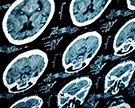
We've learned from war vets in the past decade that traumatic brain injuries or TBI are chronic diseases and not just one-time events as we had assumed for years. Victims of car wrecks, falls, and sports injuries also get TBI, which is often called silent injuries because they're not always obvious, even to the person hurt. The symptoms can simply be slower reaction times and poorer memory.
Sadly there's no cure and each person experiences brain injury uniquely.
What's worse is once people get TBI, they're also at greater risk for developing dementia. Most people are diagnosed through symptoms since there's no approved method for confirming a diagnosis.In an autopsy, dementia is found when a protein called tau is clustered in certain areas of the brain that impairs normal processes. One of the more toxic forms of tau aggregate, called oligomeric tau, may perpetuate the cell death processes in the hours and weeks after the injury.
Researchers at the University of Texas Medical Branch have developed an antibody that detects this toxic form of tau protein. Next, they plan to use a similar antibody to bind to and inactivate the tau oligomers to prevent further damage and cognitive dysfunction. This antibody appears to improve memory and learning in rodents with Alzheimer's disease
Researchers are working to ensure it's safe and effective in animals before they move on to human trials. At some point in the future, this antibody might be used as a therapeutic vaccine for many neurodegenerative disorders as well as TBI.
More Information
From trauma to tau - Researchers tie brain injury to toxic form of protein
"University of Texas Medical Branch at Galveston researchers have uncovered what may be a key molecular mechanism behind the lasting damage done by traumatic brain injury."
NINDS Traumatic Brain Injury Information Page
Website from the National Institute of Neurological Disorders and Stroke which provides comprehensive information about brain injury including diagnosis, treatment and support information